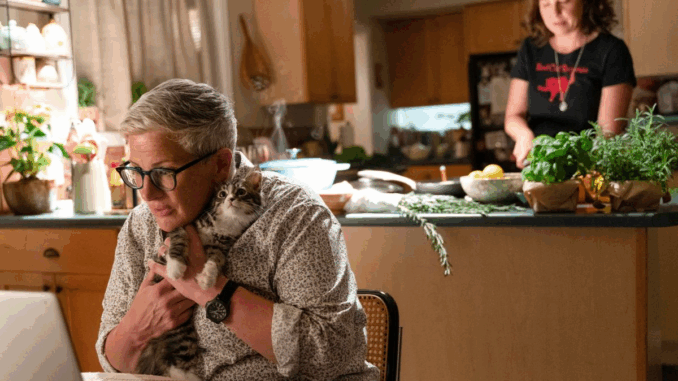
Representation on television has always been a mirror of society. While streaming platforms have been bold in pushing LGBTQ+ narratives, network TV has been slower to adapt. Enter Tracker on CBS. With the casting of Abby McEnany and Robin Weigert as lesbians, the show is making a bold, refreshing statement. This isn’t just a subplot thrown in for shock value it’s a layered portrayal of queer women on a prime-time procedural.
So, why is this so groundbreaking? And what does it mean for the future of CBS and network television as a whole? Let’s dive deep.
Tracker on CBS: A Quick Refresher
Before we dissect the importance of Abby and Robin’s storyline, let’s recap. Tracker stars Justin Hartley as Colter Shaw, a survivalist and tracker who helps solve cases while facing his own family trauma. It’s a mix of adventure, mystery, and emotional drama. But the addition of diverse characters has pushed it beyond just another procedural.
Who Is Abby McEnany?
Abby McEnany is no stranger to breaking ground. Best known for her semi-autobiographical series Work in Progress, she has built a reputation for bringing authentic queer stories to life. Her character in Tracker continues this tradition offering representation not through stereotypes but through relatable, everyday humanity.
Who Is Robin Weigert?
Robin Weigert, Emmy-nominated for her role as Calamity Jane in Deadwood, has a commanding screen presence. Her career spans powerful roles across drama and indie projects. In Tracker, she embraces another complex role, portraying a lesbian character with depth and subtlety.

The Power of Network TV Representation
When LGBTQ+ characters appear on cable or streaming platforms, it’s celebrated but expected. Network TV, however, reaches millions of households that may not subscribe to niche platforms. Representation here has a bigger cultural ripple effect.
CBS, historically seen as conservative in its storytelling, has now placed two lesbians in a central narrative. That matters.
Why Abby McEnany & Robin Weigert’s Roles Stand Out
-
Authenticity: Both actresses bring raw honesty, avoiding clichés.
-
Visibility: These roles allow middle America to see queer characters in relatable situations.
-
Nuance: Their sexuality is part of who they are, but not their only defining trait.
Tracker Isn’t Just Checking a Diversity Box
Representation can feel hollow if it’s forced. Thankfully, that’s not the case here. The writers of Tracker give Abby and Robin’s characters storylines that contribute meaningfully to the overall plot. Their relationships and personal struggles add emotional richness, not tokenism.
Audience Reactions: The Buzz Around Abby & Robin
Social media has exploded with reactions:
-
Fans praise CBS for finally showing queer love without sensationalism.
-
LGBTQ+ viewers express gratitude for seeing themselves represented.
-
Some critics argue it’s “about time” network television caught up.
Clearly, the move is sparking conversations beyond the show itself.
The History of LGBTQ+ Representation on CBS
CBS hasn’t always been progressive. Compared to networks like The CW, it lagged behind. But in recent years, shows like NCIS and All Rise introduced LGBTQ+ characters in secondary roles. Tracker is pushing this even further with Abby and Robin’s visibility.
Why This Matters for the Future of Television
Every small step in representation adds up to cultural change. Think about Will & Grace in the ’90s—it normalized gay characters for mainstream audiences. Similarly, Abby and Robin in Tracker may inspire CBS to continue investing in LGBTQ+ stories across its programming.
Justin Hartley’s Support and On-Screen Dynamics
Star and executive producer Justin Hartley has openly supported these storylines, acknowledging their importance. His character Colter’s interactions with Abby and Robin’s characters showcase acceptance without turning it into a “teachable moment.” That subtlety makes the representation even stronger.
Challenges Still Ahead
While this is progress, challenges remain:
-
Sustaining Authenticity: Representation should continue beyond one season.
-
Avoiding Tokenism: Queer characters need arcs beyond their sexuality.
-
Industry Resistance: Some audiences still push back against inclusive narratives.
What Fans Can Expect in Future Episodes
Without diving into spoilers, Abby and Robin’s characters are here to stay—at least for now. Expect their relationship to grow, face challenges, and intersect with Colter’s journey in meaningful ways.
A Richer World, A Richer Story
The inclusion of LGBTQ+ characters expands Tracker’s world, making it more reflective of reality. It proves that representation isn’t just political—it’s good storytelling.
Why Viewers Should Care
Even if you’re not part of the LGBTQ+ community, these storylines matter. Why? Because they humanize experiences you might not live yourself. That’s the magic of television—helping us walk in someone else’s shoes.
The Bottom Line
Tracker isn’t just another procedural. By giving Abby McEnany and Robin Weigert meaningful lesbian roles, CBS has proven that representation can thrive in mainstream TV. It’s a milestone worth celebrating and, hopefully, just the beginning of richer, more inclusive storytelling.
Conclusion
Television is at its best when it reflects the real world and the real world is diverse. Abby McEnany and Robin Weigert’s presence in Tracker isn’t just a casting decision; it’s a cultural statement. By embracing LGBTQ+ storylines on CBS, the show proves that love, identity, and humanity belong at the center of every story.
FAQs
1. Why is Abby McEnany’s role in Tracker so important?
Because she represents authentic queer storytelling on a mainstream platform.
2. Has Robin Weigert played LGBTQ+ roles before?
Yes, she has tackled complex characters, but Tracker is one of her most visible queer roles on network TV.
3. Is CBS usually progressive with LGBTQ+ characters?
Historically, no. But recent shows like Tracker show progress.
4. How did fans react to Abby and Robin’s storyline?
Fans praised it, especially LGBTQ+ audiences who feel seen on network TV.
5. Will Abby and Robin’s roles continue in future seasons?
While nothing is confirmed, their strong reception makes it likely they’ll remain.
